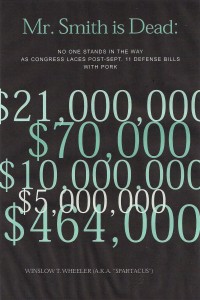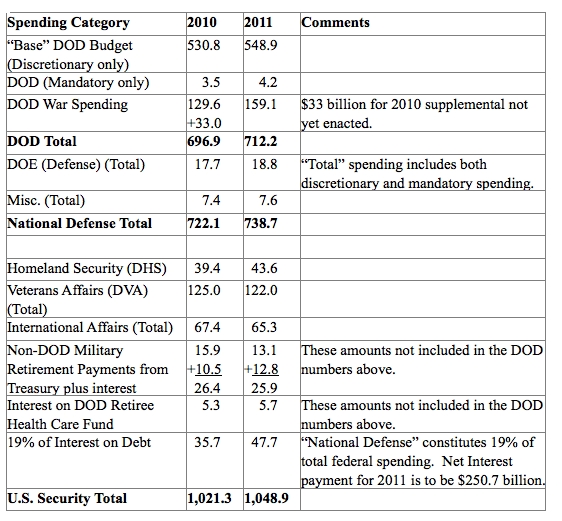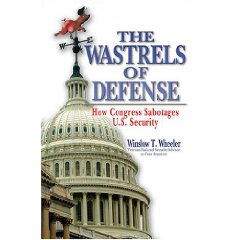Winslow T. Wheeler
Edit of 10 Oct 08 to add comment pointing to author's really excellent and detailed summary of what is wrong with Pentagon today (including budget data), and more links.
Edit of 20 Dec 07 to add links.
What the author does in this book is focus on the failings of Congress. What the author does not do is provide a more documented analysis of why and how Congress has become disconnected from the people it is supposed to represent, or why the Executive does not balance Congress when the latter abuse their powers. The “balance of power” is in fact a “balance of pork privileges,” and it is this inability, as the author describes it, to focus on all the facts, in an objective way, in order to make the best application of the taxpayer dollar, that cripples Congress (and the Executive).
I've given the author four stars because I disagree with those who would demean his motives. What I read here is consistent with the other books I have read–and my own experience talking to generally witless under-educated staff (because I am not important enough to get to the few who are “top notch”). When the author open his book by pointing out that ***all*** watchdog or balancing elements–the media, the think tanks–have failed to hold Congress accountable, I must agree with him.
The most interesting “thread” within the book has to do with information–what information gets where, who sees it, what do they do with it. At the end, the author concludes, most Members are not doing their homework, and most staffs are too busy focused on inserting partisan advantage and localized pork to actually serve the people of the United States in an effective manner.
The book is unusual in being focused on national security and defense, where the author spent his entire career, and what jumped out at me is that Congress has no grand strategy–Congress, like the Executive, is fragmented into stovepipes and is not able to make thoughtful trade-offs at the big picture level between Diplomacy Information Military Economic (DIME) instruments of national power.
The author is severely critical, and rightly so, I believe, in lambasting the Members for abdicating their Constitutional power to declare war. On page 221 he says that it is clear that Members consider their re-election prospects more important than the need to stand tall and oppose a war they do not support.
The author ends by proposing 12 steps for Congressional reform, among the most important of which is exposure of the truth to the public: no more Congressional Record “revisions,” no more secret back-room meetings, no more fake camera shots showing Senators speaking to an empty room; no more lightweight partisan staff shuttling to jobs in the Executive they are supposed to help oversee; no more stone-walling of the press; and no more lobbyists with direct access–only constituents. These are all common sense suggestions that are helpful to the public interest.
The author's last two sentences of the book are most helpful of all: “There is really only one thing that will force members of Congress to perform as best as they are able. That is for the public to have the information to distinguish the good from the bad and the phonies from the sincere.”
Public information in the public interest…this is the key.
See also, published since then:
Running on Empty: How the Democratic and Republican Parties Are Bankrupting Our Future and What Americans Can Do About It
The Broken Branch: How Congress Is Failing America and How to Get It Back on Track (Institutions of American Democracy)
Breach of Trust: How Washington Turns Outsiders Into Insiders
New Links 10 Oct 08:
The Limits of Power: The End of American Exceptionalism
The Fifty-Year Wound: How America's Cold War Victory Has Shaped Our World
The Sorrows of Empire: Militarism, Secrecy, and the End of the Republic (The American Empire Project)
War is a Racket: The Antiwar Classic by America's Most Decorated Soldier
Vice: Dick Cheney and the Hijacking of the American Presidency









